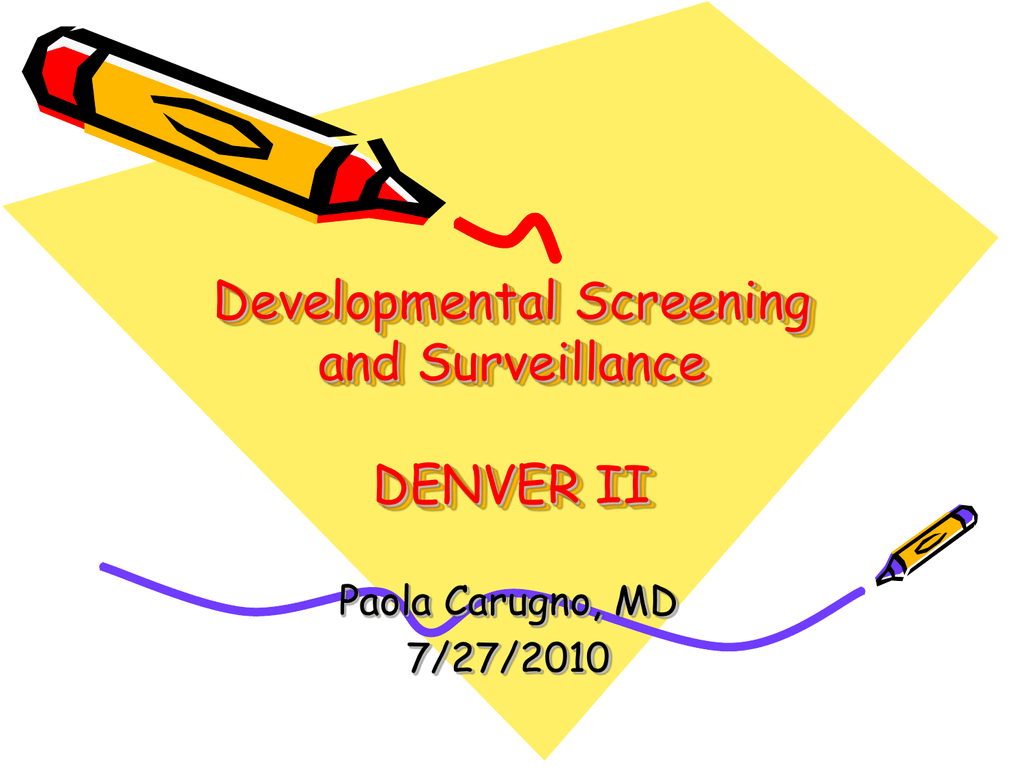Denver Developmental Screening Test
Denver Developmental Screening Test synonyms, Denver Developmental Screening Test pronunciation, Denver Developmental Screening Test translation, English dictionary definition of Denver Developmental Screening Test. A procedure for critical evaluation; a means of determining the presence, quality, or truth of something; a trial: a test of. Denver Developmental Screening Test. Birth to Six Years. This tool was developed in 1967 and measures fine motor, gross motor, language, adaptive, and personal and social skills. It is best used as an indicator for further assess-ment needs. It is limited due to its broad spectrum. About Press Copyright Contact us Creators Advertise Developers Terms Privacy Policy & Safety How YouTube works Test new features Press Copyright Contact us Creators.
The Denver Developmental Screening Test (DDST) is a screening test for cognitive and behavioral problems in children from birth until the age of 6. It was developed by William K. Frankenburg at the University of Colorado Medical Center, Denver, USA. It was first introduced by him and Josiah.B. Type of Measure: The DENVER II is a measure of developmental problems in young children. It was designed to assess child performance on various age-appropriate tasks and compares a given child’s performance to the performance of other children the same age.
The Denver Developmental Screening Test (DDST) is a test designed for use in initial screening of children to identify those with developmental problems so they can be referred for more precise evaluation and intervention, if appropriate. The test was developed and introduced in Denver, Colorado in the 1960s and is one of the most widely used developmental screening tests. Health care professionals can administer the test in clinical or office settings, and it takes between 10 and 20 minutes.
This test is intended for use in children between one month and six years of age. The exact age of the child is calculated so the administrator can select age-appropriate tasks designed to assess the child's personal and social skills, facility with language, fine motor skills, and gross motor skills. In addition to evaluating the child directly, the test administrator also asks the parents a series of questions to collect more information about how the child behaves at home.
If a child performs consistently below the standard of children in a similar age range, the Denver Developmental Screening Test will suggest the child may have a developmental problem. It is not designed to be specific, with lengthier and more detailed screening needed to evaluate children with test scores of concern. If a child performs at or above the expected level, the child is not considered to be at risk for developmental issues.
One criticism of the original Denver Developmental Screening Test was a distinct class and race bias, a common problem with standardized tests in general. Future editions were redesigned to address this problem, making the test more widely applicable and sensitive. One consequence of this has been an increased incidence of false positives on the test, something for parents to be aware of. In other words, just because a child's results on the this test are believed to be abnormal, it doesn't mean the child has a developmental problem; more testing is needed.

This test is usually readily available and may be administered multiple times as a child ages to collect information about the course of the child's development. If more screening is needed, it may be offered in the same facility, or the child may need a referral to another location. When parents are told that additional screening is recommended after the Denver Developmental Screening Test is administered, they should be aware that the practitioner may not have additional information and cannot provide a diagnosis or even a guess about what the issue might be.

Denver Developmental Screening Test Age
II. Definition
- Developmental Screening tool completed by clinicians
III. Description
- Revised from original Denver Developmental Test
- Clinician assess 125 questions
- Requires 20-30 minutes to perform
- Available in English and Spanish

IV. Efficacy
- Less class and race bias than original test
- Improved validity and sensitivity
- Higher False Positive screens than first version
- Test Sensitivity: 56-83%
- Test Specificity: 43-80%
- Not validated
- Tested in 2096 children with diverse backgrounds
Denver Developmental Screening Test Example
V. Resources
- Denver Developmental Screening Website
Images: Related links to external sites (from Bing)
Denver Developmental Screening Test Online

Denver Developmental Screening Test Ii
These images are a random sampling from a Bing search on the term 'Denver Developmental Screening Test II.' Click on the image (or right click) to open the source website in a new browser window. Search Bing for all related images